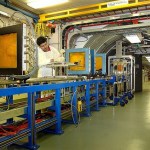DOE
The OMB has reported on the effects of sequestration that will be triggered Jan 2013 unless Congress proactively changes the law before then.
Some time ago, Congress set itself a trap: in an attempt to look like they were dealing with government spending and the deficit, they passed a law that triggers automatic cuts to spending, unless Congress agrees and passes laws that make concomitant targeted cuts or revenue increases to decrease the deficit.
The nominal cuts are about $1.2 trillion, over a decade, cut from the projected budget in the out years, and are, by design flat across-the-board…
This guest post is written by Brookhaven physicist Thomas Roser, Chair of the Collider-Accelerator Department. Roser, who earned his Ph.D. from the Swiss Federal Institute of Technology, worked at the University of Michigan before joining Brookhaven in 1991.
Thomas Roser
The chain of accelerators that leads into two of Brookhaven's major research facilities - the Relativistic Heavy Ion Collider (RHIC) and the NASA Space Radiation Laboratory (NSRL) - will soon have a new starting point.
A new ion generator, called the Electron Beam Ion Source (EBIS), will produce and accelerate beams…
Providing Students and Teachers With a Wealth of Resources in the Physical Sciences
Students, does this sound familiar?
You need information about the environment, physics, chemistry, or the earth and don't know where to go. And your teacher says that the information you reference must be authoritative. Plus, you need the information fast.
No problem!
The U.S. Department of Energy (DOE) - a Dream Festival Partner - is an excellent resource. DOE will sponsor 11 highly informative, interactive exhibits in the Festival's Expo this October at the National Mall in Washington, DC, in addition to…
Dr. Steven Koonin of the DOE recently spoke about the future of energy and its implications for the goals of the New York State University system. Given that my husband is employed by said system, and in fact teaches Environmental Physics (aka "Here's how to do the math to prove we're doomed ;-)"), this was interesting to me. Neither of us was present for this event, but a friend who was reported that Koonin stated in the presentation, as a representative of the DOE that it unrealistic to expect the US to hold carbon emissions below 450ppm and that 550ppm was the best that could reasonably…
Let's see if I can remember how to do this blogging thing....
Proposal 1: We started out doing it by the book. Picked a good research topic, and then found the appropriate RFP, with a deadline comfortably in the future. We had weekly brainstorming meetings to refine our research objectives and were just beginning to write some text, when something shook us. Suddenly our experimental design didn't seem quite so clever or practical anymore. We spent a couple of weeks trying to figure out new ways to approach the problem, and debating whether we were really going to go after the RFP after all.…

